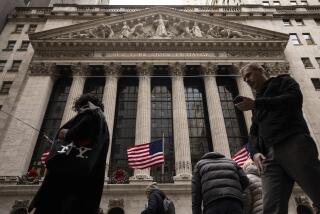Even Rich Investors Expect Less, Survey Says
- Share via
Apparently, the rich aren’t that different from everyone else: The bear market is racking even their nerves, according to a survey being released today.
The annual U.S. Trust Co. survey of affluent Americans, which polled 151 investors in April from the top 1% of wealthiest Americans, found that 69% of respondents worry that future stock market gains will be lower than they have been in recent years.
Before slumping in 2000, the blue-chip Standard & Poor’s 500 index, a key gauge of U.S. stocks, rose more than 20% each year from 1995 through 1999.
The large majority of affluent investors fretting about future returns eclipsed the 68% who said they fear that the next generation will have a harder time financially than their parents.
That marks the first time since New York-based U.S. Trust began polling the wealthy in 1993 that another worry surpassed their concern for their children’s financial future.
Other survey findings:
* On average, affluent investors’ stock portfolios dropped by 13% in the first four months of 2001, compared with a 5% drop in the S&P; 500.
More than half of those surveyed (57%), however, said they are “not making any changes” to their portfolios now, while 22% said they see the decline “as a buying opportunity” and have invested more money in U.S. stocks.
Only 20% reported selling stocks and “moving the money to safer investments.”
“Affluent investors are not panicking,” said Greg Sanford, president of U.S. Trust’s North American division.
Over the next three years the investors, on average, still expect to earn 11% a year on stocks. The sectors mentioned most often as having the “most attractive” potential over the next 12 to 24 months are health care, drugs and biotechnology (77%); energy and natural resources (74%); and financial services (62%).
* Wealthy investors have a slightly larger portion of their portfolios in domestic stocks than they did five years ago--37% versus 33%--but on average they are broadly diversified, with 23% of their assets in bonds, 16% in cash equivalents, 10% in alternative investments such as hedge funds and 9% in real estate.
* In the face of a prolonged market downturn, 54% of respondents said they would postpone capital improvements to their homes, 49% said they would cut back on big-ticket purchases such as furniture, and 43% said they would delay buying a new car or boat.
More to Read
Inside the business of entertainment
The Wide Shot brings you news, analysis and insights on everything from streaming wars to production — and what it all means for the future.
You may occasionally receive promotional content from the Los Angeles Times.










